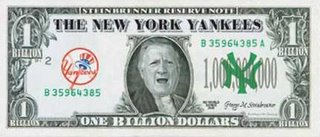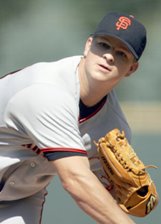Bronx Banter
Canyon of Heroes
Count the Rings
Crosstown Rivals
Futility Infielder
High and Tight
I'm No Idiot
LoHud Yankees blog
No Maas
No Sense Worrying
NYY News
Pending Pinstripes
Pinstripe Alley
Pinstriped Blog
Pride of the Yankees
River Ave Blues
RLYB
Sporting Brews
Sports World NY
Unbiased Yankee Fan
Was Watching
Weblog That Derek Built
Yankees Baseball Blog
Yankees Prospects
Yanks Blog
Yanks Fan vs. Sox Fan
Baseball Think Factory's "Looking Ahead to..." series rolled the Yankees way. I partook in the survey, so feel free to point and laugh at my answers.
| Kper9 | K/BB | BAA | OPSA | WHIP | XBH allowed | |
|---|---|---|---|---|---|---|
| Pitcher A | 5.14 | 2.00 | .211 | .571 | 1.05 | 5 |
| Pitcher B | 7.99 | 3.50 | .225 | .560 | 1.01 | 2 |
| Pitcher C | 4.80 | 4.00 | .236 | .703 | 1.00 | 5 |
So, who do you want leading your staff? Identities are revealed at the end of this post, although I doubt they're much of a secret...
Just like every Thursday, here's the highlights from yesterday's ESPN chat with BA's Jim Callis:
Bob (North Hampton, NH): How's this years crop of draft eligible catching prospects looking?
Jim Callis: Not very good. The top catcher taken will be either Pepperdine's Chad Tracy (son of Pirates manager Jim) or California high schooler Hank Conger. Conger is a switch-hitter with power, but not a lock to stay behind the plate. Florida's Brian Jeroloman is a defensive specialist, while another Florida high schooler, Max Sapp, is more of an offensive player.Mike A. (Chico, CA): Hey Jim, thanks for taking our questions. Where do you see Hochevar going in this year's draft? Would it be wise for a team that lacks upper-level talent (i.e. the Yanks) to take him in the 2nd or 3rd round considering the merely average draft class this year? Thanks again
Jim Callis: A lot is going to depend on how good he looks when he gets back on the mound in indy ball this spring. That may be a tall order, because he's coming off a long layoff and will face a lot of older hitters, many with Double-A and Triple-A experience. Hochevar, based on his 2005 form, would go in the upper half of the first round. But he probably won't be in that form, there still will be signability questions and you have to question his makeup after the Dodgers fiasco last year. So it's too early to tell where he goes. He might get to the Yankees at No. 41 after going No. 40 a year ago.Paul (San Francisco): How predictive is a good farm system of a club's future big league success? For instance, do the clubs whos farm systems you rate in the top 5 in a given year generally do well 2-3 years in the future? I guess the real question is, how fired up can we be if our teams rate as having good farm systems?
Jim Callis: I recently looked at the teams we had ranked No. 1 over the last decade, and the last club to get that ranking and fizzle was the 1997 Pirates. All of the other clubs had a great deal of success (though some, like the Braves and Yankees were already successful when ranked No. 1). Unless the club's talent is being overestimated (in retrospect, that's what happened with the 1997 Pirates), an elite system should lead to big league success.
Down on the Farm (yesterday was an ugly day for the system):
Triple-A Columbus (2-1 loss to Scranton/Wilkes-Barre)
Kevin Thompson: 1 for 4, 1 K
Melky Cabrera: 0 for 4
Eric Duncan: 1 for 3
Matt DeSalvo: 7 IP, 6 H, 2 R, 1 ER, 1 BB, 4 K - 15-1 GB/FB ratio
Double-A Trenton (9-3 loss to Altoona)
Justin Christian: 2 for 5, 1 SB - moved to leadoff spot a few games ago and took off
Rudy Guillen: 1 for 4, 1 2B, 1 RBI, 1 K - .086 BA, you can stick a fork in him, he's no longer a prospect
Danny Borrell: 4 IP, 10 H, 5 R, 5 ER, 2 BB, 3 K
High-A Tampa (4-3 loss to Fort Myers)
Brett Gardner: 2 for 4, 1 R, 1 BB, 2 K, 1 SB
Hector Made: 3 for 5, 1 R, 1 3B, 1 K
Jason Jones: 5 IP, 3 H, 2 R, 2 ER, 1 BB, 1 K
Low-A Charleston scheduled off day
Pitcher A: Josh Beckett
Pitcher B: Moose, but I’m sure you knew that already
Pitcher C: Roy Halladay
Aaron Gleeman
Amazin' Avenue
Athletics Nation
AZ Snakepit
Ballpark View
Balls, Sticks & Stuff
Baltimore Chop
Baseball Analysts
Baseball Crank
Baseball, Etc.
Baseball Musings
Beyond the Box Score
Bleed Cubbie Blue
Bless You Boys
Bluebird Banter
Brew Crew Ball
Bucs Dugout
Buster Olney's ESPN blog
Camden Chat
Cardinals Diaspora
ChiSox Daily
Crawfish Boxes
Cub Reporter
DA Humber : Baseball Central
Daily Lancer
Detroit Tigers Weblog
Dodger Thoughts
Doug's Business of Baseball
DRays Bay
Ducksnorts
Eddie Kranepool Society
Elephants in Oakland
Faith & Fear in Flushing
Federal Baseball
Fire Brand of the AL
First Inning
Fishstripes
Gaslamp Ball
Good Phight
Halo's Haven
Honest Wagner
Independent Thinking
Inside the Dodgers
Inside the White Sox
Jayson Stark's ESPN blog
Joy of Sox
Let's Go Tribe
Lookout Landing
Lone Star Ball
Major League Blog
McCovey Chronicles
Mets Blog
Mike's Baseball Rants
Minor League Ball
Only Baseball Matters
Orange and Black Baseball
Over The Monster
Peter Gammon's ESPN blog
Phillies Nation
Purple Row
Redleg Nation
Red Reporter
Rival Fish
Royals Authority
Royals Corner
Royals Review
South Side Sox
Talking Chop
Transaction Guy
Twinkie Town
USS Mariner
Viva El Birdos
The Template is generated via PsycHo and is Licensed.









